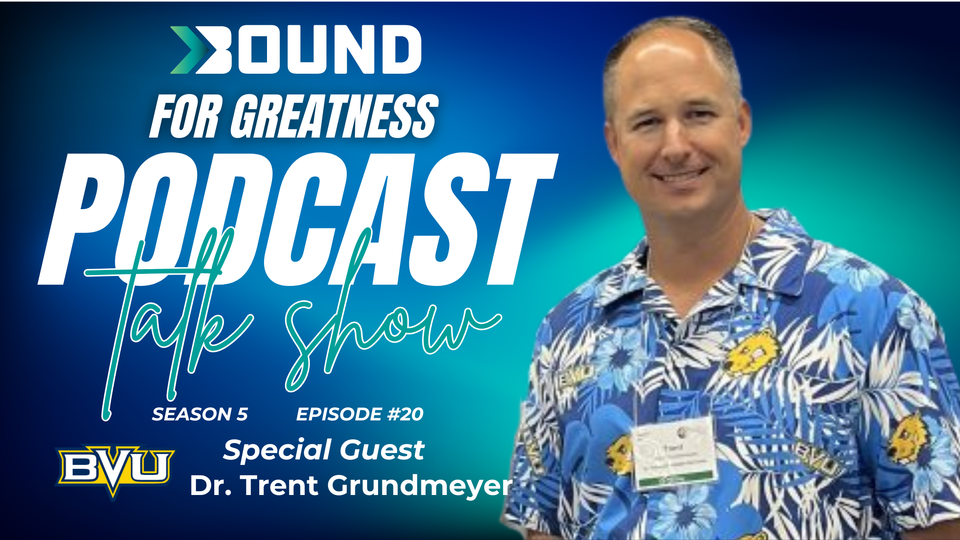Building Better School Systems Through Athletics with Dr. Trent Grundmeyer

In school communities across the nation, athletics often serve as the first impression—an emblem of pride, performance, and purpose. It’s the band playing the fight song on Friday night, the scoreboard glowing over a packed stadium, and the smiling kids in school gear waving to fans. But behind those moments of spectacle is a leadership engine, one that Dr. Trent Grundmeyer believes has the power not only to shape culture but to redefine the future of educational leadership.
In a candid, powerful conversation on the Bound for Greatness podcast, host Scott Garvis sat down with Dr. Grundmeyer, an educational leader, leadership consultant, and program director at Buena Vista University, to unpack the untapped potential of athletic administrators in shaping schools and systems.
This wasn’t just a talk about sports, it was a masterclass in how athletic leadership can drive district-wide transformation.
Athletics: The Front Porch of Every School
"Your athletics program is the front porch of your school," said Dr. Grundmeyer, invoking a metaphor that instantly stuck.
It’s not just a catchphrase. In communities across America, athletic events serve as a gateway for stakeholder engagement, where parents, alumni, students, and local leaders gather and form impressions. As Grundmeyer explained, when a school’s sports programs are thriving, when the stands are full, athletes are respectful, and coaches lead with integrity, the ripple effects reach classrooms, board meetings, and city halls.
Garvis agreed, reflecting on how his own career as an athletic director taught him the importance of being the communicator-in-chief. “Athletics are the heartbeat of the school,” he said. “We’re often the most visible leaders in the district.”
And with that visibility comes a responsibility many still overlook.
The Overlooked Path to District Leadership
Too often, athletic administrators are seen as solely “operations people.” But as Grundmeyer pointed out, the skill set of a successful AD mirrors the competencies required at the highest levels of educational leadership.
“They manage large budgets, organize events with hundreds of attendees, supervise staff, handle crisis communications, and manage student behavior,” Grundmeyer said. “That’s not fluff work, that’s executive-level decision-making.”
Still, very few athletic directors are tapped for superintendent or principal roles.
Garvis pushed on the disconnect: “Why are we not grooming more ADs for district leadership?”
Grundmeyer responded with insight: “The pipeline is there, but it hasn’t been illuminated. If athletic directors start seeing themselves as leaders beyond the scoreboard—if they start sitting in on negotiations, attending board workshops, and aligning with academic strategy—they'll be ready to lead at any level.”
Professional Development and Vertical Alignment
At the heart of their conversation was the idea of professional development—not just for head coaches and ADs, but for every level of the system.
“We talk about vertical alignment in math and reading,” Garvis said, “but we don’t do it enough in athletics. If we’re going to build programs that last, we need coaches at every level speaking the same language.”
Dr. Grundmeyer agreed, adding that great programs aren't built by accident. “The best programs operate with systems. They use a common vocabulary, have strategic coaching development, and they treat culture-building as a process—not just a personality.”
He emphasized that athletic directors need to be the strategic architects of these systems—promoting wellness, shared purpose, and sustainability.
Culture as the Competitive Edge
Great teams don’t just win games. They build legacies. And that starts with culture.
“Look at the programs that win year after year,” said Grundmeyer. “It’s not just talent. It’s culture.”
He described the activities director as a “cultural engineer”someone responsible for setting behavioral expectations, ensuring coaching consistency, and bridging the gap between athletics and academics.
“Culture doesn’t happen on its own,” he said. “It’s built. It’s nurtured. And it starts with the vision.”
That vision, Grundmeyer explained, must start at the top and be shared from the school board to the locker room.
A Unified Vision: The Key to Cohesive Leadership
One of the most powerful parts of the episode came when Garvis and Grundmeyer talked about alignment, between school board goals, district leadership, and athletic departments.
“If the board wants a certain type of culture, they need to see how the athletic program is supporting that,” Grundmeyer said.
Garvis echoed that. “When I brought the board GPA reports of our student-athletes and showed how participation led to higher performance, it changed the conversation. They started seeing the AD’s office as more than logistics. They saw it as a student success engine.”
Burnout, Balance & The Sustainability Crisis
Garvis then turned to a stark reality: burnout. With AD turnover reaching record highs and superintendent roles becoming increasingly hard to fill, the sustainability of leadership roles is under pressure.
Dr. Grundmeyer pointed to several solutions:
- Clear Expectations in Job Descriptions: Define night obligations, weekend work, and supervision expectations upfront.
- Flexible Work Models: Allow for schedule flexibility to manage the demanding hours of game nights and weekend travel.
- Personal Boundaries: Leaders must learn to say no and protect their time.
“It’s not about doing less,” Grundmeyer said. “It’s about doing what matters most, and doing it well.”
Trends, Data, and Strategic Athletic Planning
Grounding leadership in data was another recurring theme. Garvis shared how he used GPA, attendance, and behavior data to justify program expansions and investments.
Grundmeyer took it further: “It’s not just the numbers. Pair the data with stories. Show the board how this student went from failing to thriving after joining track. That combination moves mountains.”
Together, they emphasized the need for strategic planning in athletics, tying facility upgrades, coaching hires, and program goals to district-wide initiatives.
Innovative Ideas for Supporting Students
The podcast closed with practical, heartfelt examples from the field:
- "What can you give me today?" A coach's question to gauge student-athlete readiness, promoting empathy and mental wellness.
- The “Co-Role” Concept, Students not skilled enough to compete fully serve as managers and partial participants. It boosts belonging and teaches accountability.
“These are small ideas with big impact,” Grundmeyer said. “If a kid feels seen and valued, they’ll come back. That’s how we retain students and change lives.”
Advice for Aspiring Leaders
Finally, Garvis asked a question many ADs and coaches have wondered:
“What if I want to move up, to principal or superintendent position?”
Grundmeyer’s response was practical:
- Dip Your Toe In – Sit in on negotiations, volunteer for policy committees, or shadow central office leaders.
- Find a Mentor – Partner with someone in a role you aspire to and learn through observation.
- Know Your Gaps – If you’ve never done curriculum work or finance, get experience there.
- Lean Into Your Strengths – Your work ethic, adaptability, and communication skills are already district-ready.
Legacy and Leadership Beyond the Scoreboard
Dr. Trent Grundmeyer believes that athletic administrators are more than game managers, they are system builders, culture shapers, and potential district leaders.
The conversation with Scott Garvis wasn’t just inspiring, it was a call to action.
The scoreboard may show wins and losses, but the real scoreboard of leadership is written in the lives changed, the cultures built, and the legacies left behind.
And for Grundmeyer, that scoreboard isn’t in the gym.
It’s in the hearts of every student, teacher, coach, and community member who dares to believe that athletics can be a gateway to greatness, for schools, for systems, and for the future.
Learn More
About Dr. Trent Grundmeyer
Dr. Trent Grundmeyer is a nationally recognized thought leader in educational leadership and talent development. With a background as a teacher, principal, and district leader, Dr. Grundmeyer brings a systems-level approach to solving today’s most complex school challenges—from culture building and student discipline to recruitment, retention, and leadership succession.
In this episode of Bound for Greatness, Dr. Grundmeyer shares how athletic directors are the “front porch” of their schools and are uniquely positioned to become district leaders. His insights are rooted in decades of experience and his passion for empowering emerging educational leaders.
Buena Vista University Educational Leadership Program
If you’re a current educator, athletic director, or activities coordinator looking to move into building or district leadership, Buena Vista University’s Master’s in Educational Leadership offers an intentional and innovative pathway forward. The program is designed with real-world application at its core—featuring:
- Practical simulations that prepare candidates for tough leadership decisions
- Weekly wellness checks to promote leadership sustainability
- Mentorship from veteran superintendents and building leaders
- Robust internships and real-world scenarios aligned with administrator evaluations
Dr. Grundmeyer is deeply involved in shaping this program to meet the evolving needs of modern school leaders. The goal? Preparing graduates who are not only ready to lead, but to thrive.
🔗 Learn more at: bvu.edu
Grundmeyer Leader Services (GLS)
Grundmeyer Leader Services is transforming how school districts recruit and retain top-tier leadership talent. As a trusted partner to school boards, superintendents, and state organizations across the Midwest, GLS provides full-service superintendent search processes, organizational audits, and strategic planning services. Their mission is simple but powerful: to ensure schools are led by high-character, high-capacity leaders who are the right fit for their communities.
GLS also supports school leaders through customized coaching, goal-setting strategies, and team development workshops—making it a go-to resource for both aspiring and current district-level administrators.
Learn more at: grundmeyerleadersearch.com
Connect with Dr. Trent Grundmeyer
Want to learn more or bring Dr. Grundmeyer to your district for a workshop or keynote? You can connect with him directly:
- LinkedIn: Trent Grundmeyer
- Website: grundmeyerleadersearch.com

Member discussion